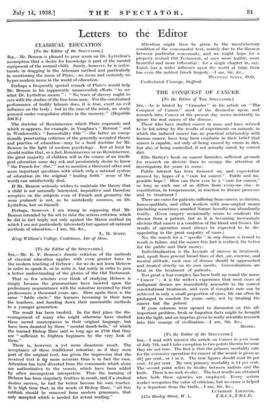[To the Editor of the SPECTATOR.]
Sin,—Mr. E. F. Benson's drastic criticism of the methods of classical education applies with even greater force to the modern teaching of Hebrew ; for we do not learn Hebrew in order to speak it, or to write it, but solely in order to gain a better understanding of the glories of the Old Testament.
That so few scholars ever think of studying Hebrew is simply because the grammarians have insisted upon the preliminary acquaintance with the minutiae invented by their predecessors a thousand years ago. Here again there is the same " futile circle," the learners becoming in their turn the teachers, and handing down their unscientific methods to a younger generation.
The result has been twofold. In the first place the dis- couragement of many who might otherwise have studied these sacred masterpieces in their original language, but have been daunted by these " mental dumb-bells," of which the learned Bishop Hare said so long ago as 1736 that they are " sufficient to frighten beginners by the very look of them."
There is, however, a yet more disastrous result. The acceptance of these traditional minutiae, as if they were part of the original text, has given the impression that the received text is fa.r more accurate than is in fact the case. Attention has been diverted from the consonants which alone are authoritative to the vowels, which have been added by often incompetent interpreters. Thus the learning of Hebrew has been singularly fruitless in result, and if a student desires success, he had far better become his own teacher. It is high time that, in the words of Bishop Hare, " all this rubbish should be removed from modern grammars, that only accepted which is needed for actual reading." Attention might then be given to the unsatisfactory condition of the consonantal text, mainly due to the likeness between particular consonants, and we might hope for a properly revised Old Testament, at once more legible, more beautiful and more influential ; for a single chapter in, say, Isaiah has a wider influence upon the world at large than has even the noblest Greek tragedy.—I am, Sir, &c., MELVILLE Scow, D.D. Castlechurch Vicarage, Stafford.




































 Previous page
Previous page